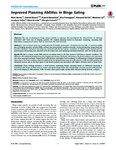Improved Planning Abilities in Binge Eating
| dc.contributor.author | Neveu, R | |
| dc.contributor.author | Neveu, D | |
| dc.contributor.author | Barsumian, F | |
| dc.contributor.author | Fouragnan, Elsa | |
| dc.contributor.author | Carrier, E | |
| dc.contributor.author | Lai, M | |
| dc.contributor.author | Sultan, J | |
| dc.contributor.author | Nicolas, A | |
| dc.contributor.author | Coricelli, G | |
| dc.date.accessioned | 2018-06-15T09:49:29Z | |
| dc.date.available | 2018-06-15T09:49:29Z | |
| dc.date.issued | 2014-08-22 | |
| dc.identifier.issn | 1932-6203 | |
| dc.identifier.issn | 1932-6203 | |
| dc.identifier.other | ARTN e105657 | |
| dc.identifier.uri | http://hdl.handle.net/10026.1/11664 | |
| dc.description.abstract |
OBJECTIVE: The role of planning in binge eating episodes is unknown. We investigated the characteristics of planning associated with food cues in binging patients. We studied planning based on backward reasoning, reasoning that determines a sequence of actions back to front from the final outcome. METHOD: A cross-sectional study was conducted with 20 healthy participants, 20 bulimia nervosa (BN), 22 restrictive (ANR) and 23 binging anorexia nervosa (ANB), without any concomitant impulsive disorder. In neutral/relaxing, binge food and stressful conditions, backward reasoning was assessed with the Race game, promotion of delayed large rewards with an intertemporal discounting task, attention with the Simon task, and repeating a dominant behavior with the Go/No-go task. RESULTS: BN and to a lower extent ANB patients succeeded more at the Race game in food than in neutral condition. This difference discriminated binging from non-binging participants. Backward reasoning in the food condition was associated with lower approach behavior toward food in BN patients, and higher food avoidance in ANB patients. Enhanced backward reasoning in the food condition related to preferences for delayed large rewards in BN patients. In BN and ANB patients the enhanced success rate at the Race game in the food condition was associated with higher attention paid to binge food. CONCLUSION: These findings introduce a novel process underlying binges: planning based on backward reasoning is associated with binges. It likely aims to reduce craving for binge foods and extend binge refractory period in BN patients, and avoid binging in ANB patients. Shifts between these goals might explain shifts between eating disorder subtypes. | |
| dc.format.extent | e105657-e105657 | |
| dc.format.medium | Electronic-eCollection | |
| dc.language | en | |
| dc.language.iso | eng | |
| dc.publisher | Public Library of Science (PLoS) | |
| dc.rights | Attribution-NonCommercial-ShareAlike 4.0 International | |
| dc.rights | Attribution-NonCommercial-ShareAlike 4.0 International | |
| dc.rights | Attribution-NonCommercial-ShareAlike 4.0 International | |
| dc.rights | Attribution-NonCommercial-ShareAlike 4.0 International | |
| dc.rights | Attribution-NonCommercial-ShareAlike 4.0 International | |
| dc.rights | Attribution-NonCommercial-ShareAlike 4.0 International | |
| dc.rights | Attribution-NonCommercial-ShareAlike 4.0 International | |
| dc.rights | Attribution-NonCommercial-ShareAlike 4.0 International | |
| dc.rights.uri | http://creativecommons.org/licenses/by-nc-sa/4.0/ | |
| dc.rights.uri | http://creativecommons.org/licenses/by-nc-sa/4.0/ | |
| dc.rights.uri | http://creativecommons.org/licenses/by-nc-sa/4.0/ | |
| dc.rights.uri | http://creativecommons.org/licenses/by-nc-sa/4.0/ | |
| dc.rights.uri | http://creativecommons.org/licenses/by-nc-sa/4.0/ | |
| dc.rights.uri | http://creativecommons.org/licenses/by-nc-sa/4.0/ | |
| dc.rights.uri | http://creativecommons.org/licenses/by-nc-sa/4.0/ | |
| dc.rights.uri | http://creativecommons.org/licenses/by-nc-sa/4.0/ | |
| dc.subject | Adolescent | |
| dc.subject | Adult | |
| dc.subject | Anorexia Nervosa | |
| dc.subject | Bulimia | |
| dc.subject | Bulimia Nervosa | |
| dc.subject | Eating | |
| dc.subject | Female | |
| dc.subject | Humans | |
| dc.title | Improved Planning Abilities in Binge Eating | |
| dc.type | journal-article | |
| dc.type | Journal Article | |
| dc.type | Randomized Controlled Trial | |
| dc.type | Research Support, Non-U.S. Gov't | |
| plymouth.author-url | https://www.webofscience.com/api/gateway?GWVersion=2&SrcApp=PARTNER_APP&SrcAuth=LinksAMR&KeyUT=WOS:000341230600065&DestLinkType=FullRecord&DestApp=ALL_WOS&UsrCustomerID=11bb513d99f797142bcfeffcc58ea008 | |
| plymouth.issue | 8 | |
| plymouth.volume | 9 | |
| plymouth.publication-status | Published online | |
| plymouth.journal | PLoS ONE | |
| dc.identifier.doi | 10.1371/journal.pone.0105657 | |
| plymouth.organisational-group | /Plymouth | |
| plymouth.organisational-group | /Plymouth/Faculty of Health | |
| plymouth.organisational-group | /Plymouth/Faculty of Health/School of Psychology | |
| plymouth.organisational-group | /Plymouth/REF 2021 Researchers by UoA | |
| plymouth.organisational-group | /Plymouth/REF 2021 Researchers by UoA/UoA04 Psychology, Psychiatry and Neuroscience | |
| plymouth.organisational-group | /Plymouth/Users by role | |
| plymouth.organisational-group | /Plymouth/Users by role/Academics | |
| plymouth.organisational-group | /Plymouth/Users by role/Researchers in ResearchFish submission | |
| dc.publisher.place | United States | |
| dcterms.dateAccepted | 2014-07-27 | |
| dc.identifier.eissn | 1932-6203 | |
| dc.rights.embargoperiod | Not known | |
| rioxxterms.versionofrecord | 10.1371/journal.pone.0105657 | |
| rioxxterms.licenseref.uri | http://creativecommons.org/licenses/by-nc-sa/4.0/ | |
| rioxxterms.licenseref.startdate | 2014 | |
| rioxxterms.type | Journal Article/Review |



